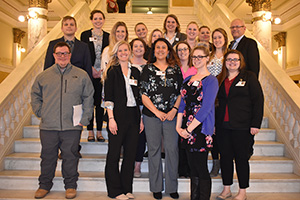South Dakota LEND Trainees Experience the State Legislative Process
February 28, 2018

|
Leadership is the first word in the full definition of LEND. Underlying leadership are a dozen MCH competencies. The South Dakota Leadership Education in Neurodevelopmental and Related Disorders (LEND), housed at the Center for Disabilities in the University of South Dakota Sanford School of Medicine, takes one of those competencies-Policy and Advocacy-and engages its LEND trainees in an immersion experience with the policy makers and influencers in the state.
University of South Dakota LEND believes that in order to advance policy change, one must not only know the system and how it works, but to also get to know those who influence decisions and make policy. For the past eighteen years South Dakota LEND trainees have had an intense twenty-four hour seminar into South Dakota state government connecting the trainees with the people who make thing happen in the branches of government. The seminar meets at the State Capitol during legislative session and in 2018 the trainees met a wide variety of those in the policy arena.
Governor Dennis Daugaard met with the trainees where he expanded on his initiative on workforce development. Within that initiative is the Ability for Hire component. This applies to state government where barriers toward employment for those with disabilities are being removed. It also addresses the private sector where information toward hiring a more diverse workforce is being shared. Governor Daugaard will be honored on March 20 at the AUCD Gala for his leadership in increasing employment and other opportunities for South Dakotans with disabilities and their families.
The trainees met with Representative Jean Hunhoff, vice-chair of the Joint Appropriations Committee. In addition to sharing her career path (which largely centered on health care), Representative Hunhoff visited about health related issues facing the Legislature. She also reflected on the challenges that face well-intentioned people on opposite sides of an issue.
The judicial system is often overlooked when people think of legislation. However, the courts are called upon interpret what is meant by a law in light of facts in a particular case. South Dakota Supreme Court Justice Glen Severson described the challenges that courts face in applying the law to a case. He also traced his career from beginning in farming, going into the military where he was an electronics technician, to receiving undergrad and law degrees, to being a general purpose attorney in a firm, to entering the judiciary as a circuit judge, and now as a Supreme Court Justice.
The South Dakota Department of Health Director of Family and Community Health, Colleen Winter, shared the structure and goals of the Department. She noted an emphasis on prevention, access to care, partnerships to enhance health, and the importance of infrastructure in supporting life-long health for South Dakotans.
Often referred to as the 'fourth branch of government' lobbyists play a significant role in the South Dakota Legislature. The combination of term limits, a very short thirty-eight day legislative session, and limited staff lead legislators to rely on information from lobbyists from government agencies, the private sector, non-profits, advocacy groups, and citizens. Terry Dosch, the Executive Direction of the South Dakota Council of Mental Health Centers, described his role as a lobbyist for that organization over the past twenty-five plus years. He emphasized the importance of being credible, reliable, and listening.
Finally, the trainees met with Jason Hancock, director of the Legislative Research Council (LRC). The LRC serves as the non-partisan support to legislators, drafting bills, doing research, and providing revenue estimates. Mr. Hancock shared how easy access to legislative information is available over the web, both in documents and archived recordings of testimony. It is through this information that all advocates can stay abreast of the workings of the state legislature.
Amidst all of these meetings, the trainees attended committee meetings on a variety of topics including increasing the age at which students enter elementary school, needling, transgender issues, Medicaid, revenue projections, and state sales tax on food. While each state is unique in how their legislative process works, common to all is accessing decision makers. The South Dakota LEND trainees have taken that first step in establishing those relationships.
For more information on the South Dakota LEND Legislative Seminar contact Dr. Greg Boris at: [email protected]







